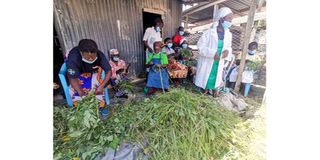Kisumu widows thriving on indigenous vegetable farming

Awuoth Women Group sort indigenous vegetables at Nyamasaria in Kisumu. The group has embraced innovative solar technology to boost the shelf life of vegetables.
What you need to know:
- In 2019, they successfully applied for a USAid in-kind donation and got two tractors, water pumps, a cooling unit, a solar drier, a weighing scale, and Knapsacks for the one-year African leafy vegetables project.
- One of the requirements for the donation was for the group to get 500 individuals to support the work.
In 2015, a group of 28 widows from Kolwa, Kisumu East, formed a support group, to enable them to educate their children.
The founder and leader of Awuoth Widows support group, Yuanita Hongo, invited fellow widows to start the group.
Eight years later, they have stood the test of time and group dynamics, to achieve most of their goals.
Apart from providing members with a savings plan, the group has been a blessing to hundreds of women and youths within the sub-county by creating jobs.
Ms Hongo says they started off by saving as low as Sh20 a week, with the amount increasing yearly.
The initial plan was to save funds to support orphans’ education.
By the end of the year, they had saved more than Sh20,000. They then organised a mini-fundraiser, making more than Sh40,000 for the orphan project.
“We were more than convinced that the group would succeed. We decided to raise our savings to Sh50 a week, with an aim of purchasing plastic chairs and tents to rent out,” says Ms Hongo.
She adds: “The plan was to raise funds for one-and-a-half years, and later invite the members for a mini-fundraiser.”
Income
By the end of 2018, they had raised Sh110,000, which was used to buy 60 chairs and a tent, which generated income on weekends when they could rent them out to event organisers.
Each year, the group shared out part of savings and carried the rest forward to the next year.
In 2019, they successfully applied for a USAid in-kind donation. They got two tractors, water pumps, a cooling unit, a solar drier, a weighing scale, and Knapsacks to carry out a one-year African leafy vegetables project.
One of the requirements for the donation was for the group to get 500 individuals to support the work.
While the machines needed for the project cost more than Sh2 million, the group was required to contribute Sh635,000, which they did from their savings.
“We were to bring in 400 women and 100 youths who automatically landed employment,” says Jerusa Odhiambo, a member of the group.
The individuals would cultivate local vegetables, sell them to the group members who would then sell to local markets.
While the project ended last year, the group has continued with it.
Dubbed the Awuoth Women Agricultural Empowerment Programme, the initiative now focuses on improving nutrition of local households through intensive agribusiness.
“We focus on the value addition of local vegetables. The excess products are dried using a solar drier, packed, preserved and can last up to six months,” says Ms Hongo.
To qualify, one had to own a parcel of land, the Awuoth members would then provide the individuals with seeds, organic manure, tractors, and water pipes on a cost-sharing basis. They also had to undergo training.
“The amount paid by the farmers is used to service the tractors and pay drivers and motorcycle riders who do the deliveries,” she says.
Once the vegetables are ready for harvesting, the members visit the farms and buy them at Sh40 per kilogramme.
“We sell the produce in the open markets within Kisumu, schools and to small-scale traders,” says Pamela Ogada, another member.
The group has expanded their supplies to supermarkets, and stores within Kisumu. Excess vegetables are sorted, cleaned, dried, packaged and stored in bags.
The waste produced during the drying process is taken back to farms and used as manure.
“The income has helped members to increase their savings, which currently stands at a minimum of Sh4,000. We have also linked them to a bank where they can get loans,” concludes Ms Hongo.





